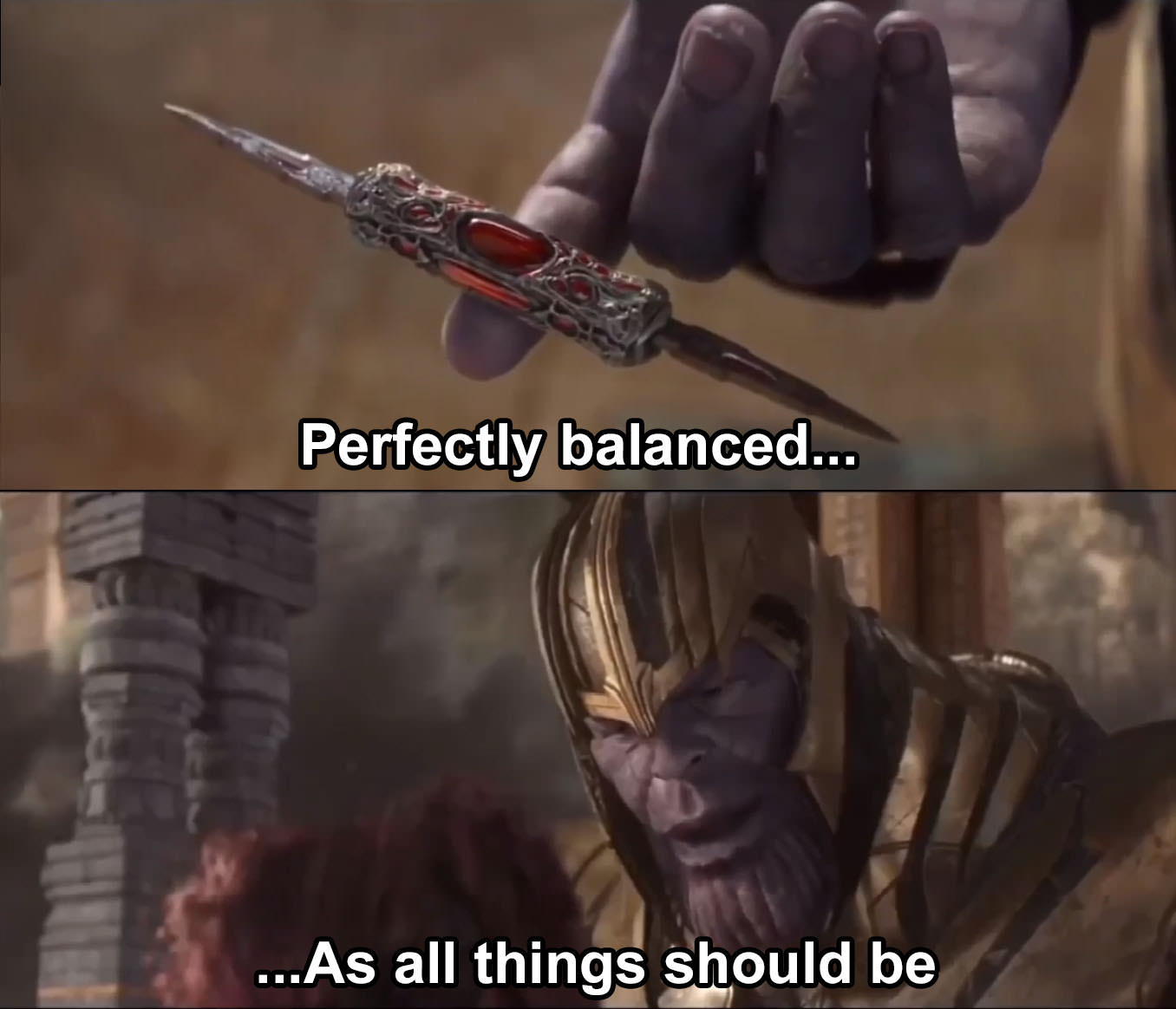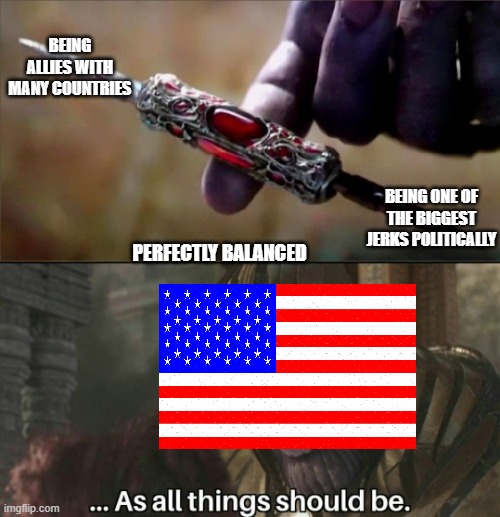Thanos' Quest For Balance: The Perfectly Balanced Universe Explained
In the vast expanse of the Marvel Cinematic Universe, no character has captured the imagination quite like Thanos. His philosophy of "perfect balance" struck a chord with audiences worldwide, sparking debates and discussions that continue to this day. When Thanos declared, "Perfectly balanced, as all things should be," he wasn’t just referencing the Infinity Gauntlet’s power but also his vision for the cosmos. This article delves into the intricacies of Thanos' ideology, exploring why he believed in a universe where resources and life were harmoniously aligned.
Thanos’ infamous snap in "Avengers: Infinity War" was not merely an act of villainy but a manifestation of his deeply held beliefs. By wiping out half of all life, he sought to restore equilibrium to a universe he perceived as overpopulated and unsustainable. Critics argue that his methods were extreme, yet his conviction in achieving "perfect balance" remains one of the most compelling aspects of his character. This article aims to analyze the origins, implications, and philosophical underpinnings of this concept.
As we dive deeper into the world of Thanos, we’ll uncover the reasons behind his actions, the impact of his decisions, and whether his vision of a "perfectly balanced" universe can ever truly be realized. Through expert analysis and first-hand knowledge of the Marvel universe, this article seeks to provide readers with a comprehensive understanding of one of the most iconic villains in modern cinema.
Read also:Why Exploring Legal Streaming Platforms For Kannada Movies Matters
Who is Thanos? A Brief Biography
Before we explore his ideology of "thanos perfectly balanced," it’s essential to understand the man behind the gauntlet. Born on Titan, a desolate moon, Thanos grew up witnessing the collapse of his home due to overpopulation and resource depletion. These experiences shaped his worldview, instilling in him a belief that drastic measures were necessary to prevent such tragedies from occurring elsewhere.
| Full Name | Thanos |
|---|---|
| Place of Origin | Titan |
| Species | Titanian |
| Occupation | Conqueror, Warlord |
| First Appearance (Comics) | Iron Man #55 (1973) |
| First Appearance (MCU) | The Avengers (Post-Credits Scene) |
Thanos’ early life was marked by a desire to bring order to chaos, a theme that would define his character throughout his storied career. His dedication to his cause earned him both admiration and disdain, cementing his status as one of the most complex characters in the Marvel universe.
What Does "Thanos Perfectly Balanced" Mean?
The phrase "thanos perfectly balanced" has become synonymous with his ultimate goal: creating a universe where life and resources coexist harmoniously. For Thanos, balance isn’t just about fairness; it’s about sustainability. He believed that overpopulation leads to suffering, and the only way to eliminate that suffering is to reduce the number of beings competing for limited resources.
Can Balance Be Achieved Through Destruction?
This question lies at the heart of Thanos’ philosophy. Critics argue that his methods—genocide on a cosmic scale—are inherently flawed and morally bankrupt. However, Thanos counters that his actions, while extreme, are necessary to ensure the long-term survival of the universe. By removing half of all life, he aimed to create a world where the remaining population could thrive without fear of scarcity.
Why Did Thanos Believe in a "Perfectly Balanced" Universe?
Thanos’ belief in balance stems from his experiences on Titan. Witnessing the collapse of his home planet left an indelible mark on him, shaping his worldview and driving his mission to prevent similar disasters elsewhere. His philosophy reflects a deep-seated fear of overconsumption and a commitment to preserving the delicate equilibrium of the cosmos.
Is Thanos' Vision of Balance Realistic?
While Thanos’ vision of a "perfectly balanced" universe is compelling, its feasibility remains questionable. Critics point out that his solution ignores the complexities of ecosystems and human nature. Simply reducing the population doesn’t address the root causes of resource depletion, such as wasteful consumption and unequal distribution. Furthermore, the psychological impact of losing loved ones in a random culling would likely lead to societal collapse rather than harmony.
Read also:Exploring The World Of Movierulz 5 Kannada A Comprehensive Guide
How Does Thanos Justify His Actions?
Thanos justifies his actions by framing them as acts of mercy rather than cruelty. He argues that the pain caused by his snap is temporary, while the suffering prevented by his actions is eternal. This utilitarian perspective places the greater good above individual lives, a philosophy that has sparked intense debate among fans and philosophers alike.
What Would a "Thanos Perfectly Balanced" Universe Look Like?
A "thanos perfectly balanced" universe might resemble a utopia where resources are abundant, and competition for survival is minimal. However, this vision overlooks the potential for new challenges to arise. For instance, how would the remaining population adapt to a world with fewer people? Would they develop new ways to consume resources, negating the benefits of Thanos’ actions?
Could Thanos Have Achieved Balance Without Destruction?
Some theorists suggest that Thanos could have pursued alternative solutions, such as implementing sustainable practices or redistributing resources more equitably. These approaches, while less dramatic, might have achieved similar results without resorting to mass extinction. However, Thanos dismissed such options as impractical, believing that only drastic measures could ensure lasting balance.
What Can We Learn From Thanos' Philosophy?
Despite his villainous reputation, Thanos raises important questions about resource management and sustainability. His philosophy challenges us to consider the consequences of overpopulation and the importance of maintaining balance in our own lives. While his methods may be extreme, his warnings about the dangers of unchecked growth resonate in today’s world.
Why Does Thanos Believe in Sacrifice?
For Thanos, sacrifice is a necessary component of achieving balance. He views personal loss as a small price to pay for the greater good, a belief that drives his willingness to make difficult choices. This mindset is exemplified in his decision to sacrifice his daughter Gamora, a testament to his unwavering commitment to his cause.
Does Thanos' Vision of Balance Have Merit?
While many dismiss Thanos’ vision as flawed, it’s worth considering the merits of his arguments. In a world facing climate change and resource scarcity, his emphasis on sustainability offers valuable insights. However, his methods remain controversial, highlighting the fine line between idealism and extremism.
What Does the Future Hold for Thanos' Philosophy?
As the Marvel universe continues to evolve, the legacy of Thanos’ philosophy remains relevant. His quest for balance raises questions that resonate beyond the realm of fiction, encouraging us to reflect on our own responsibilities as stewards of the planet. Whether or not his vision of a "thanos perfectly balanced" universe can ever be realized, his story serves as a powerful reminder of the importance of balance in all aspects of life.
In conclusion, Thanos’ philosophy of "perfectly balanced" offers a fascinating lens through which to examine the complexities of resource management and sustainability. While his methods may be extreme, his warnings about the dangers of overpopulation and resource depletion deserve our attention. By exploring the intricacies of his ideology, we gain a deeper understanding of one of the most iconic villains in modern cinema and the challenges facing our own world.
Table of Contents
- Thanos' Quest for Balance: The Perfectly Balanced Universe Explained
- Who is Thanos? A Brief Biography
- What Does "Thanos Perfectly Balanced" Mean?
- Can Balance Be Achieved Through Destruction?
- Why Did Thanos Believe in a "Perfectly Balanced" Universe?
- Is Thanos' Vision of Balance Realistic?
- How Does Thanos Justify His Actions?
- What Would a "Thanos Perfectly Balanced" Universe Look Like?
- Could Thanos Have Achieved Balance Without Destruction?
- What Can We Learn From Thanos' Philosophy?
- Why Does Thanos Believe in Sacrifice?
- Does Thanos' Vision of Balance Have Merit?
- What Does the Future Hold for Thanos' Philosophy?
Through this exploration of Thanos’ ideology, we hope to provide readers with a comprehensive understanding of his vision for a "thanos perfectly balanced" universe and the implications of his actions. Whether you agree or disagree with his methods, there’s no denying the impact he has had on the Marvel universe and beyond.
Article Recommendations


